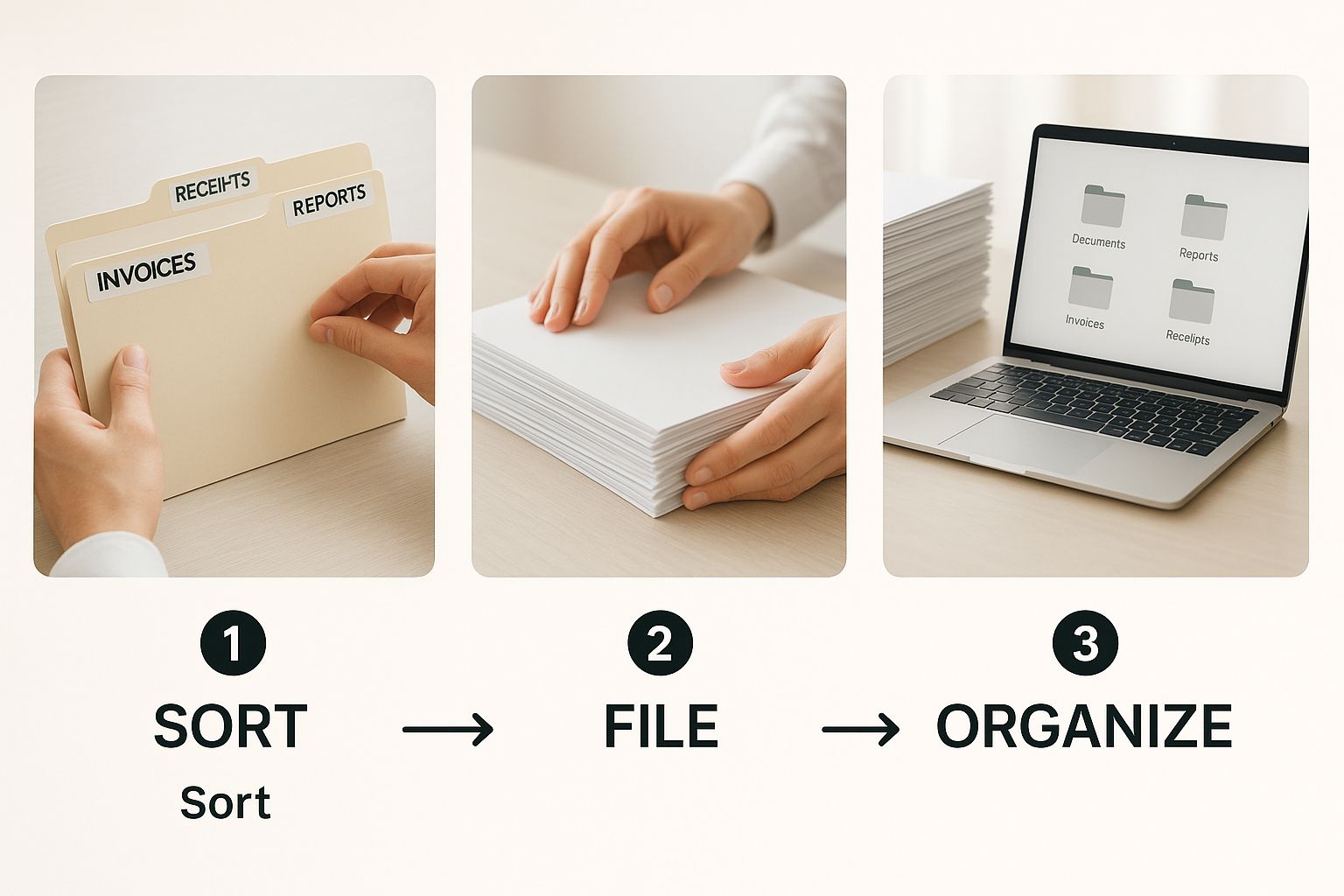A Witness Guide to Preparing for Deposition
"I was satisfied once John Bell took over my case."
"Communication was always timely."
A Witness Guide to Preparing for Deposition
Before we dive into how to prepare for your deposition, let's talk about what you're actually preparing for. The core of good preparation isn't just about memorizing facts; it's about understanding the process so you can give clear, truthful, and concise answers under oath.
This isn't the time to try and "win" the case. Your job is to create a solid, reliable record of the facts as you know them. Getting this right is a huge step in your overall legal journey.
What to Expect from the Deposition Process

First things first: a deposition isn't a courtroom trial. There’s no judge or jury. Think of it more like a formal interview where you’re under oath. It’s a fact-finding mission for the other side, and a court reporter is recording every single word.
It’s important to see where this fits into the bigger picture. For most people, a deposition is a major milestone in the https://www.belllawoffices.com/personal-injury-claims-process/. The testimony you give helps both sides size up the case, which almost always plays a big role in whether, and for how much, the case settles.
The Key Players in the Room
When you walk in, the setup can feel a little intimidating, but it’s pretty straightforward. You'll usually see the same few people at the table:
- Opposing Counsel: This is the other side’s lawyer, and they'll be the one asking you questions. Their job is to find information that helps their client.
- Your Attorney: Your lawyer is your advocate. They're there to protect your rights, object to improper questions, and make sure the rules are followed. They can't answer for you, but they have your back.
- The Court Reporter: This is a neutral professional who transcribes everything said. This official transcript can be used later in court, so accuracy is everything.
The Purpose Behind the Process
So, why are they doing this? A deposition serves a few key purposes. It's a way for the other side to lock in your story, making it very difficult for you to change your testimony down the road. It's also their chance to see what you're like as a witness—how you handle pressure and how credible you seem.
Since a deposition will often cover the entire timeline after an incident, having a firm grasp of your complete recovery roadmap after a car accident can be incredibly helpful in organizing your thoughts.
It's also worth noting that the legal field is evolving. The global legal tech industry is on track to hit $25 billion by 2025, with new tools making depositions more efficient. We're seeing more remote video depositions and even AI-assisted transcription, which is changing how things are done. This push toward technology is making it easier for everyone to access high-quality preparation.
The 4 Pillars of Your Deposition Preparation
Walking into a deposition cold is a recipe for disaster. True confidence doesn’t come from winging it; it comes from methodical preparation. I’ve found that the best way to turn nervous energy into a feeling of control is to break the process down into four core pillars. This framework covers everything from the nitty-gritty details of the evidence to your own mental and physical state on the day.
Pillar 1: Master the Documents
Your preparation journey begins with the evidence. Long before you ever sit across from opposing counsel, you and your attorney need to become the world’s leading experts on every document relevant to your case.
This means a deep dive into all the key files—emails, contracts, medical records, text messages, you name it. The goal here isn't just to skim but to build a concrete, fact-checked timeline of events in your mind. This is how you refresh your memory on the specifics that matter.

Think of this process as turning a jumble of puzzle pieces into a clear, coherent picture. That clarity is the bedrock of strong, confident testimony.
Pillar 2: Strategize With Your Attorney
Your lawyer is your most critical ally in this process. But "collaboration" means more than just a quick phone call the day before. It means rolling up your sleeves and getting into dedicated practice sessions to sharpen your testimony. The single most effective tool for this is the mock deposition.
During these practice runs, your attorney will take on the role of the opposing lawyer, hitting you with the same kinds of tough, tricky, or confusing questions you'll face in the real thing. It’s an invaluable experience because it helps you:
- Refine your answers: You learn to respond truthfully and concisely, without accidentally volunteering extra information that could hurt your case.
- Tame your nerves: Getting a feel for the pressure in a safe, controlled setting makes the actual deposition far less intimidating.
- Get real-time feedback: Your lawyer can instantly point out where an answer might be misinterpreted and help you rephrase it for clarity and impact.
This is also where you and your legal team get completely aligned on the core themes of the case. When you understand the key points you need to establish—and the weak spots the other side will likely attack—you can anticipate where the questioning is headed. While depositions have their own unique pressures, many of these preparation principles are universal. For instance, those preparing for administrative proceedings might benefit from our guide on how to prepare for a disability hearing.
A mock deposition isn't just a rehearsal; it's a strategic stress test. It's designed to expose weaknesses, build your confidence, and make sure you and your attorney are moving as one.
Pillar 3: Dress and Act the Part
How you present yourself matters. Your appearance and demeanor send a powerful, non-verbal message about your credibility and respect for the legal process. The goal is to project competence and seriousness.
This means dressing professionally, as if you were going to an important business meeting or a job interview. For men, that typically means a suit or a jacket and tie. For women, a business suit, dress, or conservative blouse and skirt/slacks is appropriate. Stick to neutral colors and avoid anything flashy, distracting, or overly casual.
Your demeanor is just as crucial. Maintain a calm, cooperative, and respectful attitude at all times, even if the questioning becomes aggressive. Sit upright, make eye contact, and avoid fidgeting or defensive body language like crossing your arms. You are there to provide truthful facts, not to engage in a battle of wits. A composed presence reinforces that you are a credible, trustworthy witness.
Pillar 4: Get Your Head in the Game
Finally, never underestimate the mental and physical side of preparation. This isn't just about knowing the facts; it’s about being in the right state of mind to recall and communicate them clearly under pressure. Showing up exhausted, stressed, or mentally scattered makes you vulnerable to making costly mistakes.
Prioritize a full night’s sleep before your deposition. A rested mind is a sharp mind, better equipped to listen carefully and handle the stress of the day.
On the morning of, eat a balanced meal. Avoid loading up on caffeine, which can amplify anxiety and make you jittery. The objective is to be calm, alert, and fully present, so you can concentrate completely on the questions being asked and give accurate testimony.
To help you keep these pillars organized, here is a quick summary of the key actions for each.
Deposition Preparation At-a-Glance
This table breaks down the four pillars into actionable steps, helping you focus your efforts where they matter most.
| Master the Documents | Review all relevant emails, contracts, reports, and records. Create a detailed timeline of events. Identify key facts and figures. | To build a rock-solid command of the facts so your memory is fresh and accurate. |
| Strategize With Your Attorney | Participate in at least one mock deposition. Discuss case themes and potential tough questions. Clarify any confusing points. | To practice your responses, manage nerves, and ensure you and your lawyer are perfectly aligned. |
| Dress and Act the Part | Choose professional, conservative attire. Practice calm, respectful body language. | To project credibility, seriousness, and respect for the legal process. |
| Get Your Head in the Game | Get a full night's sleep before the deposition. Eat a balanced meal and avoid excess caffeine. | To be mentally sharp, focused, and calm, enabling you to give your best testimony. |
By systematically working through these four areas, you can walk into your deposition with the confidence that comes from knowing you are truly prepared.
Handling Difficult Questions and Attorney Tactics

Let's be clear: the lawyer on the other side isn't there to be your friend. They are highly trained to ask questions that can test your composure, create confusion, and ultimately get you to say something that helps their case.
Knowing their playbook is the best way to stay on track. Your job isn't to outwit them. It's to be a calm, factual, and steady witness.
The single most powerful tool you have is the pause. Seriously. Before you even think about answering, take a breath. This small moment gives you time to understand the question, think about your answer, and—crucially—give your own lawyer a chance to object. It’s your testimony; you control the pace.
Listen Carefully, Answer Precisely
This sounds simple, but it's where most witnesses get into trouble. It's so tempting to answer the question you think they're asking or to jump ahead to what you assume they'll ask next. Resist that urge.
When you volunteer extra information, you can inadvertently open up whole new lines of questioning you and your lawyer never planned for. The trick is to listen to the exact words used and answer only that. Then, stop talking.
- If the lawyer asks: "Did you speak with Mr. Smith on Tuesday?"
- A good answer is: "Yes."
- A bad answer is: "Yes, I did. We talked about the project deadline, and he seemed pretty stressed about it because of the issues with the supplier..."
See the difference? That extra context is a gift to the opposing counsel. Stick to the plan: listen, pause, answer the specific question, and then be quiet.
Identifying Common Attorney Tactics
Seasoned attorneys have a bag of tricks they use to control the deposition. Being able to spot them is the first step in not falling for them. This is where the guidance you get when hiring a personal injury attorney really pays off, as they can prep you for these specific scenarios.
Here are a few classic tactics to watch for:
- Compound Questions: This is when a lawyer crams two questions into one sentence, like, "You saw the red car run the light and then you immediately called 911, correct?" This is designed to confuse you. It is perfectly fine to say, "Can you please ask me one question at a time?"
- Leading Questions: These questions try to put words in your mouth. "You weren't paying much attention to the road, were you?" Don't feel pressured to agree if it's not true. A simple, firm "No, that's incorrect" is all you need.
- Interrupting Your Answer: Some lawyers will cut you off mid-sentence. They do this to rattle you or stop you from explaining your answer. Just stay calm. Let them finish their interruption, then answer their new question. Your lawyer is taking notes and will make sure you get a chance to clarify anything important later on.
Remember: A deposition is not a conversation. It's a formal Q&A. You are not there to fill awkward silences or help the other attorney build their case. You're there to provide truthful facts.
Phrases That Protect Your Testimony
You're human. You aren't expected to have a perfect, movie-like memory of every single detail. In fact, it's far better to admit you don't know something than to guess and be proven wrong later.
Keep these phrases in your back pocket. They are your best friends.
- "I don't recall." This is the perfect answer if you genuinely can't remember.
- "I don't know." Use this if you never had the information in the first place.
- "Can you rephrase the question?" If a question is confusing, long-winded, or you just don't understand it, ask for a do-over.
- "That's all I recall at this time." This is a great way to signal that you've said all you can on a subject.
Using these phrases doesn't make you look weak or evasive. It shows you're a careful, well-prepared witness who is committed to telling the truth.
How You Look and Act Matters More Than You Think
Long before you say a single word, the other side’s attorney is already sizing you up. They’re observing how you carry yourself, what you’re wearing, and your overall demeanor. It might sound superficial, but in a deposition, perception is a huge part of the game.
Your testimony is the main event, of course. But your appearance and body language are the supporting acts that can either make or break the performance. Getting this right is a non-negotiable part of your preparation.
Dress the Part: Professional and Unremarkable
Your outfit has one job: to make you forgettable. You want the lawyers to remember what you said, not the loud tie or flashy jewelry you wore. The goal is professional, conservative, and completely free of distractions.
Business casual is always a safe bet.
- For Men: You can't go wrong with a collared shirt and slacks. Adding a blazer or suit jacket is a good touch. Steer clear of anything with prominent logos, bold patterns, or overly casual wear like jeans or sneakers.
- For Women: A simple blouse paired with professional slacks or a skirt is perfect. A conservative business dress is also a great option. Keep accessories minimal—anything that jingles, dangles, or distracts is a no-go.
Think of it this way: your clothes should project respect for the process. You're there to be seen as a credible, responsible person, and letting your testimony shine is the number one priority.
Your Body Language is Speaking, Too
Believe it or not, how you sit can send a powerful message. If you're slouching, constantly fidgeting, or looking at the floor, the opposing counsel might interpret that as insecurity or, even worse, dishonesty. It doesn't matter if you're telling the absolute truth; your body language can accidentally undermine your words.
Try to sit upright but in a way that feels natural, not stiff. This shows you're engaged and confident. When the attorney is asking a question, look at them. It signals that you're listening carefully and taking the process seriously. Rest your hands on the table or in your lap to keep nervous tapping or fidgeting in check.
These aren't just small details; they have a real psychological effect. They help frame you as a composed and credible witness who isn't easily rattled. Maintaining a calm, respectful tone—even if the questions get aggressive—is just as important.
This level of detailed planning is crucial in every part of a case, especially when things get complicated, like with international depositions. Did you know that over 20 countries have significant legal roadblocks for American-style depositions? This forces lawyers to get creative, navigating wildly different legal systems, time zones, and cultural expectations.
Sometimes, this means moving the entire deposition to a country that allows it, like relocating a session for a witness in China to Hong Kong. You can learn more about these global legal puzzles in Planet Depos' comprehensive guide. It’s a perfect example of why every single detail, right down to your posture, plays a role in the final outcome.
Watching Out for Common Deposition Traps
Even with perfect preparation, a witness can get tripped up by a skilled opposing lawyer. Knowing what these traps look like ahead of time is your best defense. This isn't just about what you should do; it's about what you absolutely should not do.
These aren't abstract concepts—they are real, in-the-moment mistakes that can seriously hurt a case. The goal is to spot them as they happen and stick to a calm, factual response.
Guessing When You Don't Have the Answer
The hot seat of a deposition can make you feel like you have to know everything. That pressure often leads to one of the worst mistakes you can make: guessing. A guess, even a seemingly harmless one, can be proven wrong later on, and just like that, your credibility is shot.
It’s perfectly acceptable if you don't know something. Just say, "I don't know." If you can't remember a specific detail, say, "I don't recall." These are complete and powerful answers. They protect your testimony and prove you're only interested in the truth.
Getting Drawn into an Argument
Let's be clear: the other side's lawyer might try to get under your skin. They could ask loaded questions, twist your words, or adopt a hostile tone. It's a tactic. Falling for it and starting an argument is a huge mistake.
Your job isn't to win a debate; it's to provide facts. Keep your cool and remain professional. If the questioning becomes truly aggressive, your own attorney is there to handle it. Reacting with anger just makes you look unstable and can cause you to say something you shouldn't.
The deposition room is not a battlefield. It's a place for gathering information. If you treat it that way, you'll stay in control of your testimony and your emotions.
Giving Away Free Information
This is one of the oldest tricks in the playbook. The lawyer asks a simple, direct question. You give a simple, direct answer. Then... silence. The lawyer just sits there, looking at you. It feels awkward, and the natural human tendency is to fill that silence by talking more. Don't do it.
Resist the urge to elaborate. Answer only the question that was asked, then stop.
- Bad Example: "Yes, I signed the contract on Tuesday, but only after my boss told me to, and he seemed really rushed that day."
- Good Example: "Yes."
That extra, unasked-for information just gave the lawyer a whole new set of questions to ask. Be precise and be quiet.
The stakes for getting this right are higher than ever. Corporate legal departments are feeling the pressure, with 57% increasing their budgets to deal with a rise in disputes. Preparation is key—currently, only 43% of corporate counsel feel "very prepared" for litigation, and they're turning to better risk management to close that gap. You can read more about these litigation trends to understand why major organizations are so focused on this process.
Answering "What If" Questions
Lawyers love hypothetical questions. "What if you had known X, would you still have done Y?" These questions are pure speculation, designed to trap you into an answer that can be distorted and used against you later.
You are only there to testify about what actually happened, not what might have happened in an alternate universe. You can—and should—politely refuse to answer. A simple, firm response like, "I can only testify to what I actually did," is the perfect way to shut down that line of questioning.
Common Deposition Questions (and Straightforward Answers)
It's completely normal to have some last-minute questions, even after you've prepared diligently. Let's tackle some of the most common ones I hear from clients. Getting these cleared up beforehand can make all the difference in feeling composed and in control.
What Happens If I Realize I Said Something Wrong?
First off, don't panic. It happens to everyone. The pressure of a deposition can easily cause you to misremember a date, mix up a name, or misspeak. The key is to correct it immediately.
As soon as you realize your mistake, simply say, "I'm sorry, I need to correct something I said a few minutes ago." Don't let it slide. Your attorney will jump in and help you get the correction on the record. It’s always better to fix a small error right then and there than to have it used against you down the road to question your credibility.
How Long is This Going to Take?
This is probably the number one question I get asked, and the honest answer is, "it depends." For a relatively simple case, we might be done in just a couple of hours. But for more complex matters with a lot of history, it's not uncommon for a deposition to last a full day or even stretch across multiple sessions.
I’ll give you my best estimate based on the specifics of our case, but you should always block off your entire day. The last thing you want is to be stressed about another appointment while you're trying to give careful testimony.
Remember This: Your lawyer is your advocate and your protector during the deposition, but they can't be your voice. Their job is to shield you from improper questions, not to feed you answers.
Can My Lawyer Help Me if I Get Stuck on a Question?
Your lawyer is absolutely your lifeline in the room, but their role during the actual questioning is very specific and limited by court rules. We will definitely object to improper questions—things that are confusing, argumentative, designed to harass you, or that ask for privileged information.
However, we are legally prohibited from coaching you or telling you what to say. You're the one under oath, so the testimony has to be yours alone. A pro tip: when you hear me object, use that as a cue. It’s a signal to pause, take a breath, and think very carefully before you answer.
What if I Just Need a Break?
Depositions are draining. It's a mental marathon. You are absolutely entitled to ask for a break whenever you need one.
Whether you're feeling fatigued, getting flustered, or just need to use the restroom, don't ever feel like you have to push through. Simply say, "I'd like to take a five-minute break." Taking a moment to step out, stretch, and clear your head is one of the smartest things you can do. It's far better than continuing when you're not sharp and risking a costly mistake.
Going through a deposition is about more than just reciting facts; it's about understanding the strategy and the process. At Bell Law, our attorneys are in our clients' corner every step of the way, making sure they're not just prepared, but truly protected. If you're facing a deposition in Oregon and need an experienced guide, get in touch with our team for dedicated legal support. Learn more about our approach at belllawoffices.com.
Disclaimer: The information on this page is provided for general informational purposes only and is not legal advice. Reading this content does not create an attorney-client relationship. For advice about your specific situation, please contact a licensed attorney.







